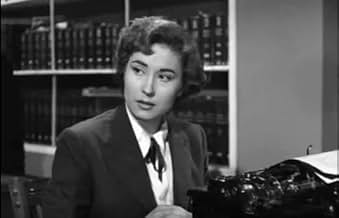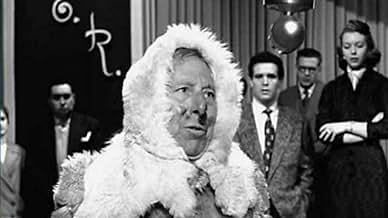Ajouter une intrigue dans votre langueThree different stories whose central axis are radio listeners: several contestants have to get to a radio station studio dressed as Eskimo, a thief answering a call in the house which is st... Tout lireThree different stories whose central axis are radio listeners: several contestants have to get to a radio station studio dressed as Eskimo, a thief answering a call in the house which is stealing and a school teacher who participates in a contest to get money to cure a child of ... Tout lireThree different stories whose central axis are radio listeners: several contestants have to get to a radio station studio dressed as Eskimo, a thief answering a call in the house which is stealing and a school teacher who participates in a contest to get money to cure a child of his village. The stories are linked by the love story of a speaker and his fiancée and thr... Tout lire
- Réalisation
- Scénario
- Casting principal
- Récompenses
- 2 victoires au total
- Alfredo
- (as Juan José Menéndez)
- Empleada
- (as María Teresa del Río)
- El médico
- (as Nicolás Perchicot)
Avis à la une
Entertaining and engaging film with social habits , religious sentiment , fraternity and good feeling . The common denominator in all the stories and in the overarching plot is the presence of the radio - it brought music, news, stories , escape and comfort, made stars of everyday people and was often the glue in families and relationships . A series of vignettes involving radio personalities is intertwined with the lives of various attractive characters . Being three different stories very influenced by ¨Luis Garcia Berlanga's Bienvenido Mister Marshall¨ (1952) as well as the Comedian Italian in episodes from the Fifities created by writer/producer Sergio Amadei . In Historias de la radio (1955) stands out a great main and support cast with plenty of familiar faces of the Fifties , giving all of them nice interpretations .
This sentimental motion picture was competently directed by Jose Luis Saenz De Heredia who went on making a sequel : Historias de la Television (1965) with Concha Velasco , José Luis López Vázquez and Alfredo Landa . Heredia was a controversial figure in Spain because of his strong and unabashed support of dictator Francisco Franco . At the beginning his career he was hired by Luis Buñuel , as executive producer , to direct ¨La Hija De Juan Simon¨ (1935) and ¨Quien Me Quiere a Mi¨ . During the Spanish Civil War , Jose Luis Heredia is detained but freed thanks to Luis Buñuel and Santiago Ontañon . Heredia directed various ¨Propaganda films¨ . It is well known the main title ¨Raza¨ written by General Francisco Franco under pseudonym : ¨Jaime Andrade¨ . As Jose Luis became the official filmmaker of the dictatorship , as he writes ¨Escuadrilla¨ (1941) . Posteriorly ,in the 40s , he directs several successful dramas : ¨El Escandalo¨ (43) based on Pedro Alarcón novel , ¨Mariona Rebull¨(1947) based on Ignacio Agusti book , ¨La Aguas Bajan Negras¨ based on Armanado Palacio Valdes , ¨El Destino Se Disculpa¨ based on Wenceslao Fernández Florez , ¨Don Juan¨ based on Don Juan Tenorio by Zorrilla , ¨Bambu¨ about the Cuba War and ¨¨Mies Es Mucha¨. In addition , a very good drama about Carlistas wars : ¨Diez Fusiles Esperan¨ . Heredia subsequently makes inferior comedies as ¨Grano De Mostaza¨, ¨Derechos De La Mujer¨ and ¨La Decente¨ . And various Manolo Escobar/Concha Velasco vehicles such as ¨Pero En Que País Vivimos¨, ¨Juicio De Faldas¨, Relaciones Casi Publicas ¨and ¨Me Debes Un Muerto¨. And other films for Paco Martínez Soria: ¨Se Armo El Belen¨, ¨Don Erre Que Erre¨. His greatest hits were ¨Historia De La Radio¨(1955) and ¨La Verbena De La Paloma¨ or ¨The fair of the dove¨.
When Heredia tries his hand at straightforward slapstick, as with the José Isbert number of the eskimo-inventor with the dangerous dog early in the film, it's quite nicely done, and the laughs come easily. When he laces the comedy with sentimentality, and deliberately racks up the sentiment in a steady crescendo throughout, it would take a very undemanding (or old-fashioned) audience nowadays not to get restless. That a dispute (for example) between would-be burglar and intended victim is resolved by a Parish priest is perhaps sociologically admissible; that this priest should be portrayed as a paragon of wisdom and Christian virtues is perhaps understandable given ths strictures of censorship and so on; but the sentimental excesses of this movie go well beyond that, and include a penitent bread-thief in a church, a dying boy whose every other script sentence contains a Noble Gesture; and a schoolmaster who is so well aided by the praying boy and the intercession of Saints, that he develops a previously unsuspected footballing career. If this kind of thing doesn't stand up so well nowadays (not to mention statues of saints that come alive) it's perhaps just a question of fashion. All the same, you end up thanking your nearest St Antony for the genius of a Berlanga, who could make a film funny without playing any of the cheap sentiment cards that this movie has recourse to. Watchable but terminally dated.
My very first Spanish movie was Almodovar's "Tacones lejanos", hunky Miguel Bosé plays a weird guy, just fantastico. And so I started to see more of the Spanish films. The release date of "Historias de la radio" surprised me because it was produced during Franco's reign, a time where freedom of press or expression was repressed.
It's a warm comedy of how radio connected people when TV was not yet largely introduced in Spain. Three stories about two inventors, a theif and people from a village. I especially remember the quiz-show with live audience. When the presenter asks the audience who knows the name of the footballer who made a goal in a certain match some 20 years ago, an old man raises his hand and gives a very detail answer. The presenter feels strange and asks how come he knows that, the old man replies that he was that footballer.
I don't want to compare this one with Woody Allen's because this one was produced far too many years advance, a pioneer of the genre. The pretty face of Carmen (by Margarita Andrey) is very impressive. What a pity that she had a very short acting life. Her father was a Swiss official who job was related to film industry. After she got married in 1955, (the release date of this movie), she retired from the camera. In 1953, her movie "Aeropuerto" was awarded National Syndicate of Spectacle, Spain (Premio del SNE).
A definite for viewing of the entire family. DVD is available now, check the websites in Spanish, yet no idea whether subtitles of other languages are available. Caveat emptor.
Le saviez-vous
- ConnexionsReferenced in Radio Days (1987)
- Bandes originalesLa Romera
Written by José Antonio Ochaíta (as Ochaíta), Xandro Valerio (as Valerio), and Juan Solano (as Solano)
Performed by Gracia Montes
Meilleurs choix
Détails
- Durée1 heure 35 minutes
- Couleur
- Mixage
- Rapport de forme
- 1.37 : 1






























